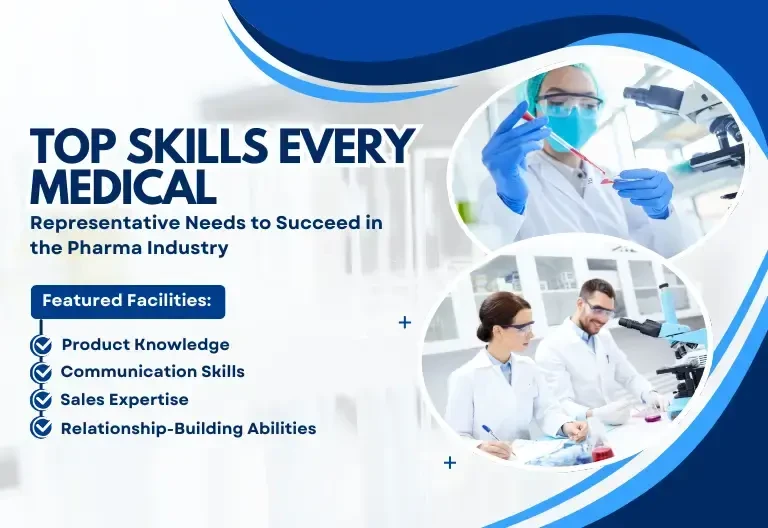
The pharmaceutical industry is constantly evolving, with new treatments, technologies, and regulations shaping the way healthcare professionals deliver patient care. In this dynamic environment, Medical Representatives (MRs) play a crucial role in promoting and selling pharmaceutical products to doctors, pharmacists, and hospitals. At Natcon Biolife Sciences, we recognize the importance of having skilled and knowledgeable MRs who can thrive in this fast-paced industry. Here are the top skills that every Medical Representative needs to succeed in the pharma industry.
1. Product Knowledge
One of the most essential skills for any MR is a deep understanding of the products they are promoting. A successful MR must be well-versed in the features, benefits, side effects, and usage guidelines of the pharmaceutical products they represent. This knowledge enables them to confidently answer any questions from healthcare professionals and provide accurate, evidence-based information that helps doctors make informed decisions for their patients. Staying up-to-date on product developments, new clinical studies, and emerging medical trends is crucial for building trust and credibility.
2. Communication Skills
Effective communication is at the heart of every successful MR’s role. Whether speaking with doctors, pharmacists, or hospital administrators, an MR must be able to clearly explain the value of their products and how they can benefit patients. This requires the ability to articulate complex medical information in a simple and engaging manner. Additionally, strong listening skills are equally important, as MRs need to understand the specific needs and concerns of healthcare professionals in order to tailor their presentations and recommendations accordingly.
3. Sales Expertise
As the primary responsibility of an MR is to drive sales, strong sales skills are crucial for success. MRs must be adept at identifying and capitalizing on sales opportunities, building relationships with potential clients, and negotiating effectively. Successful MRs know how to present their products in a way that aligns with the healthcare provider’s needs and budget, ensuring that both parties are satisfied. Understanding the sales process, from prospecting to closing deals, is essential for meeting sales targets and contributing to the company’s growth.
4. Relationship-Building Abilities
In the pharmaceutical industry, relationship-building is a cornerstone of success. MRs are not just selling products – they are building long-term partnerships with healthcare professionals. Establishing trust and rapport with doctors, pharmacists, and hospital staff is critical in fostering a collaborative environment where both the MR and the healthcare provider can share valuable insights. Strong interpersonal skills, empathy, and the ability to maintain professional relationships are key to securing repeat business and gaining loyalty from clients.
5. Time Management and Organizational Skills
The role of an MR involves juggling multiple responsibilities, from visiting healthcare providers to managing product inventories and maintaining sales records. Excellent time management and organizational skills are crucial to ensure that no aspect of the job is neglected. Successful MRs must be able to prioritize tasks, schedule appointments efficiently, and stay on top of follow-ups and documentation. Being organized helps them maximize their productivity and ensures that they can meet deadlines and sales goals.
6. Adaptability and Problem-Solving
The pharmaceutical industry is constantly changing, with new regulations, products, and competitors emerging regularly. An MR must be adaptable and able to quickly adjust to these changes. Whether it’s learning about a new product launch or adapting to a new sales strategy, MRs must be open to change and ready to tackle challenges as they arise. Additionally, problem-solving skills are essential when addressing concerns from healthcare professionals or overcoming obstacles in the sales process. Being proactive and finding creative solutions ensures long-term success in the industry.
7. Networking and Market Insight
Having a strong professional network and deep insights into the market landscape is invaluable for an MR. Networking with key stakeholders in the healthcare industry, attending industry events, and staying connected with peers helps MRs stay informed about trends and market shifts. A well-developed network also opens doors for new opportunities, making it easier to introduce products to new clients and expand market reach.
Conclusion
In conclusion, a successful Medical Representative in the pharmaceutical industry must possess a diverse skill set, including in-depth product knowledge, strong communication and sales expertise, relationship-building abilities, effective time management, adaptability, and market insight. At Natcon Biolife Sciences, we prioritize these skills in our MRs to ensure that they can not only meet but exceed the expectations of healthcare professionals. By continuously developing these competencies, MRs can make a lasting impact on patient care, promote innovative products, and drive the growth of the pharmaceutical industry.
